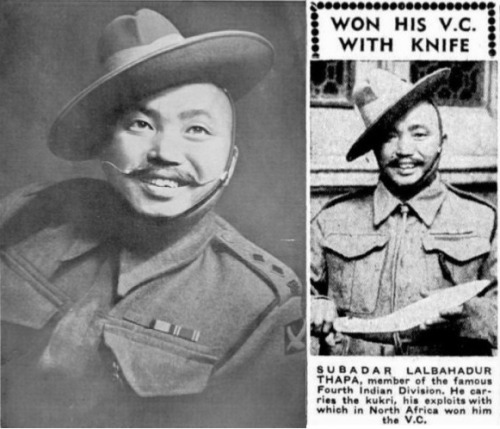Where Gurkhas Dare — Lalbahadur Thalpa and the assault on Rass-ez-Zouai In April of 1943 the B
Where Gurkhas Dare — Lalbahadur Thalpa and the assault on Rass-ez-Zouai In April of 1943 the British Army planned a quick and decisive advance into German held Tunisia during the final phases of the North Africa Campaign. The plan was to assault a heavily defended position called Rass-ez-Zouai, a fortified German outpost located at the top of a very steep cliff. The assault on Rass-el-Zouai would be especially challenging, as there was only one narrow pathway leading up to the cliff, which was guarded by machine gun nests, infantry trenches, guard towers, anti-tank guns, and mortar pits. The British would have to take the outpost quickly, or else the Germans could reinforce the position, halting the advance.The challenge of taking Rass-ez-Zouai was left to Lalbahadur Thapa, second in command of a company from the 3rd Gurkha rifles of the Indian Army. The Gurkha’s, a people who live in the Himalayan regions around Nepal and India, are especially noted for being brave and tough soldiers. For centuries the Gurkha’s upheld a warrior tradition, successfully defending their small realm from those who dared mess with them. By the 19th century, after suffering terrible casualties trying to invade Gurkha lands, the British hired them as mercenaries. Since then the Gurkha’s have served with the British Indian Army, even taking part in modern day conflicts such as Iraq and Afghanistan.On the night of April 5th Thapa commanded a company of Gurkha’s on an attack on Rass-ez-Zouai. Rather than outright assaulting the outpost, the Gurkhas conducted a silent attack, using stealth and guile to achieve their objectives. With the darkness of the night as their ally they crept up on each guard post, machine gun pit, and infantry trench. They were armed with bayonets and kukuri’s, large curved blade knives which were the traditional weapons of the Gurkha. Without being seen or heard they rushed each each enemy position, silently killing the German soldiers with their knives without being discovered. In this manner, the Gurkhas made their way up the cliff, taking out all the German guards, machine gunners, and soldiers that fortified the narrow pathway. Incredibly the Gurkhas made their way to the top of the cliff without alerting the German garrison of their attack.Once in position at the top of the cliff they organized their final assault on the fortified outpost. Under heavy machine gun fire, mortar fire, and grenade attacks they charged the outpost, engaging the Germans in close combat with kukri’s and pistols. The attack was so swift and terrifying that it took only a moment for the Gurkhas to massacre the entire German garrison. The taking of the outpost formed a bridgehead into enemy lines, from which the entire division proceeded. Within a month and a half, the German Army was forced to retreat from North Africa.For his leadership of the Gurkha company, Lalbahadur Thalpa was awarded the Victoria Cross, the highest award for gallantry offered by the United Kingdom and the Commonwealth. He later served honorably through the Italian Campaign, even taking part in the Battle of Monte Casino. He achieved the rank of Subedar-Major (Sergeant Major), the highest non-commissioned rank in the Indian Army. He passed away in 1968 at his home in Nepal. His Victoria Cross is currently on display in the Gurkha Museum in England. -- source link
Tumblr Blog : peashooter85.tumblr.com
#history#gurkhas#north africa#tunisian campaign#badass#badasses#wwii#tunisia#war#battle#combat

